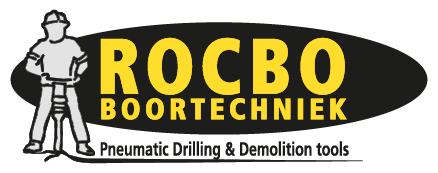Applications
APPLICATIONS
ROCBO offers a wide variety of productsolutions for a wide range of applications, like Construction in mountainous areas/mining/tunneling, Concrete drilling, Concrete repair, Lightning protection/grounding, Construction and renovation, Diving companies, Facade renovation, Airport construction/harbor construction, Demolition and renovation, Road and waterway construction.
| Mountainous areas / Mining / Tunneling |
There are many applications for drilling in stone. Some of the most common applications are:
To successfully drill into stone, equipment that complies with the highest standards is required. A measure of success is the number of meters that can be drilled with a drill rod/drill bit/integral drill. The drilling speed also determines the efficiency of the drilling operations. Rocbo Rocbo supplies drilling equipment that complies with the high standards of these users. |
||||||||||||
| Concrete drilling |
Drilling holes in concrete is an everyday activity for many specialist companies. With adhesive anchors in concrete, there is often a need to drill large numbers of holes with a small diameter (< 50 mm). Hammer drills (rotary-percussion) are usually used for this. Pneumatic hammer drills are particularly suitable for this. The combination of the pneumatically-driven turning and hammering forces mean that pneumatic drilling is the most rapid and efficient drilling technology for projects where hundreds or thousands of holes must be drilled. Projects in which pneumatic drilling is used often involve the construction/renovation of: Alternatives to pneumatic hammer drills include electrically-driven or hydraulically-driven hammer drills. In general, it can be said that pneumatic drilling is three times faster than with an electric drill of the same weight class. Rocbo supplies a wide range of pneumatic and hydraulic drilling equipment from top European manufacturers. Of course, we can supply many different drills from our extensive stocks. ' We also supply a variety of accessories for use with these drilling technologies. These include: • Dust extraction Rocbo is the European distributor for E-Z Drill, concrete drilling systems in use worldwide for the construction of roads, harbors and airports. Together with our Dutch partner Demto, we design and construct drilling masts for attachment to excavators. Our made-to-measure drilling systems have helped many customers in situations where standard products could not provide a solution. |
||||||||||||
| Lightning protection / Grounding |
Due to climate change, we are faced with increasingly extreme weather conditions: thunder and lightning are more common. A proper grounding system is not just important for lightning protection systems; it is also an essential part of electrical installations.
|
||||||||||||
| Diving companies |
Working under water is a highly specialized profession. That's why we only offer the very best range of equipment for this specialized and often heavy work. Holes may be drilled under water with pneumatic drills from BBG or Spitznas.
• Pneumatic chipping/demolition hammers Top-quality machines for the safest way of working, even far below the water surface. |
||||||||||||
| Facade renovation | An important aspect of maintaining brick facades is repairing and renewing the mortar. The mortar course is removed with chipping hammers and chisels.
The most powerful way of removing mortar is with a pneumatic mortar raking hammer and specially-designed mortar chisels (also known as widia chisels). Rocbo supplies widia chisels and chipping hammers in various weight classes for this work.
Dust control is also an important topic in the facade renovation sector. We can inform you about various solutions for dust extraction and water spraying. |
||||||||||||
| Demolition and Renovation |
The wrecking ball has been consigned to history in the demolition sector. Today, demolition and renovation are carried out with modern technology and equipment. Materials are separated and recycled.
|
